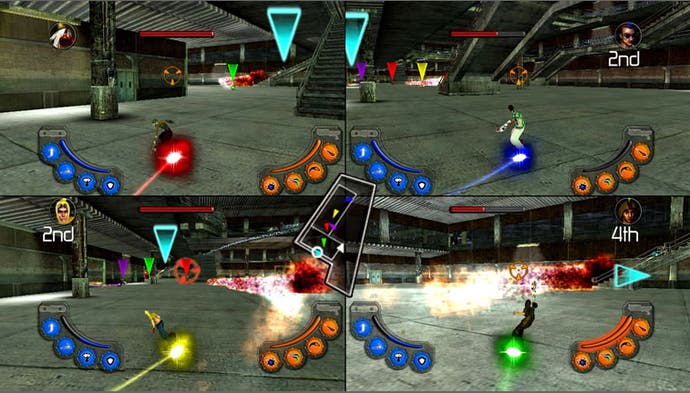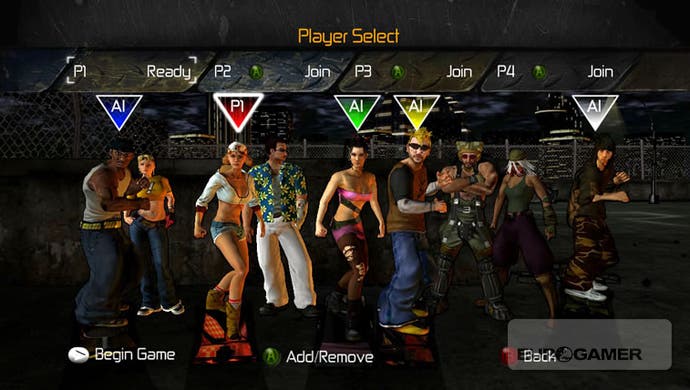Street Trace: NYC
Hover bored.
It's been a good many years since we've seen a character roster quite so embarrassing as that offered in Street Trace: NYC. The hopeful protagonists (dubbed 'tracers') line-up in front of you begging selection, each seemingly lifted wholesale from a 'street cool' 3D model library disc that fell off the front a second rate CG magazine in the mid-nineties. Token black man, Mack ('Can't nobody stop me now' he blurts when you select him), rubs shoulders with the peroxide blonde, wrap-around shade-wearing Rocket, while Hotrod, his unbuttoned Hawaiian shirt flapping in the breeze, stares with nonchalance through hollow eyes. Meanwhile the girls pose all awkward gait; shoulders thrust back so their breasts balloon forwards, poor texturing and low polygon frames shifting the intended titillation to something closer to queasiness.
It's a cruel way to start a review, and we're sure that the character artist/ modeller is a frightfully nice chap who can turn out delightful work with the right tools, brief and budget, but the wider point is that this unsuccessful grasping at imagined street culture cool continues through every aspect of the game. The game's visual framework is ugly, off-putting, lacking in any shade of authenticity or soul and the game is all the weaker for it.
Perhaps the developer felt bound to pitch the game's style in this direction. After all, this is a futuristic hoverboard game set in a post-apocalyptic New York. Still, the whacky costumes and Z-list voice acting do nothing to bring life and vibrancy to the perpetually murky environments that make up the game's drab vision of a future New York.
Dreamcast fans will remember Trickstyle, a good-looking hoverboard sports game, with which this Xbox live Arcade title shares a few surface similarities. The basic control mechanism sees you manoeuvring your character on his Back to the Future 2-style hover board around a variety of different environments and game types. You're armed with four different weapons (mines, a pulse rife, a scattergun multishot and heat-seeking rockets), each one mapped to a bumper or trigger. The face buttons allow you to jump, boost, grind and brake respectively.

All eight of these functions can be upgraded in between matches with money you collect on the battlefield (the apocalypse must have burned holes in everyone's pockets) and you'll often need to resort to racing around picking up the cash simply to give yourself a much-needed advantage over your rivals in the next competition stage. These stages come in a variety of guises including Deathmatch, straight point-to-point races (both with and without weapon restrictions) and even capture the flag style brawls. During the single player campaign you play a diverse line-up of these game types as you vie to win the championship. However, it's in this variety that Street Trace displays an uncertainty as to what it really wants to be, particularly as it excels in none of them.
The control system is, at first, a little over complex and unwieldy, something not helped by the high-speed of your board. Its gloopy turning circle coupled with high-speed, perpetual motion (unless you manually cut the engine) and the scenery placed to hinder progress rather than corridor it makes navigating these small environments an un-enjoyable difficulty. It's particularly frustrating in races, which require you to leap over crate containers and negotiate gaps and bridges with a precision the controls don't afford. Rather than weaving your way stylishly through disintegrated New York streets as the designers presumably hoped you would, you'll instead be ricocheting off the sides in an ungainly, stuttering manner that's never very satisfying.
The system is more successful in the death match modes where the emphasis is more firmly on direct combat. Here knocking into scenery is less severely punished and, as these environments are larger areas there's more space to spread out and explore. The combat itself is lightweight: all opponents move extremely fast so you'll need to rely on the game's generous auto-targeting in the main. Indeed, the control of your reticule is rudimentary at best and this ensures you never feel quite in control of the offensive elements of the game. In most game types power-ups litter the ground and are used to refill your boost and ammunition gauges or grant temporary invincibility and other upgrades. It's by-numbers videogame design and, like most other aspects of the game, lacks creativity and character.

AI enemies are constantly on your back and it often feels as if they are all ganging up on you, exploiting your every mistake while rarely missing a tricky rail-slide or shot themselves. It's the easiest thing in the world for a coder to make an infallible AI opponent. The illusion of imperfection is the tricky thing and Street Trace fails in providing players with believable computer-controlled opponents.
Over Xbox Live the game fares better, although any sniff of lag renders the game unplayable thanks to the speed and precision required for successful play. With seven different modes to pick between you'd think there'd be enough variety to keep things interesting. But each game type plays out in a similar way, despite the different rules, and the core mechanic isn't substantial or enjoyable enough to keep you coming back for more. Also, the game, even this soon after release, appears unpopular. We played one Time Trial race last week and managed to come first in the world on our second attempt in a leaderboard populated by just a handful of names.
Ultimately, Street Trace is a bored game, built from a thousand cookie-cuter design clichés that add up to an uninspired, wearisome whole. This is a game that tries too many things and overreaches itself both in terms of its core mechanics and the visuals that clothe them. The amount of work that's required to create character models that behave like they're really skating (not to mention hoverboarding) is, on this evidence, beyond the scope and budget of a Live Arcade title in these days where the full-price releases have raised players' expectations stratospherically high. There is a place for more substantial 3D games like this on the platform but Street Trace: NYC provides nothing to recommend itself over the slew of more tightly focussed and expressed rivals on the platform.








